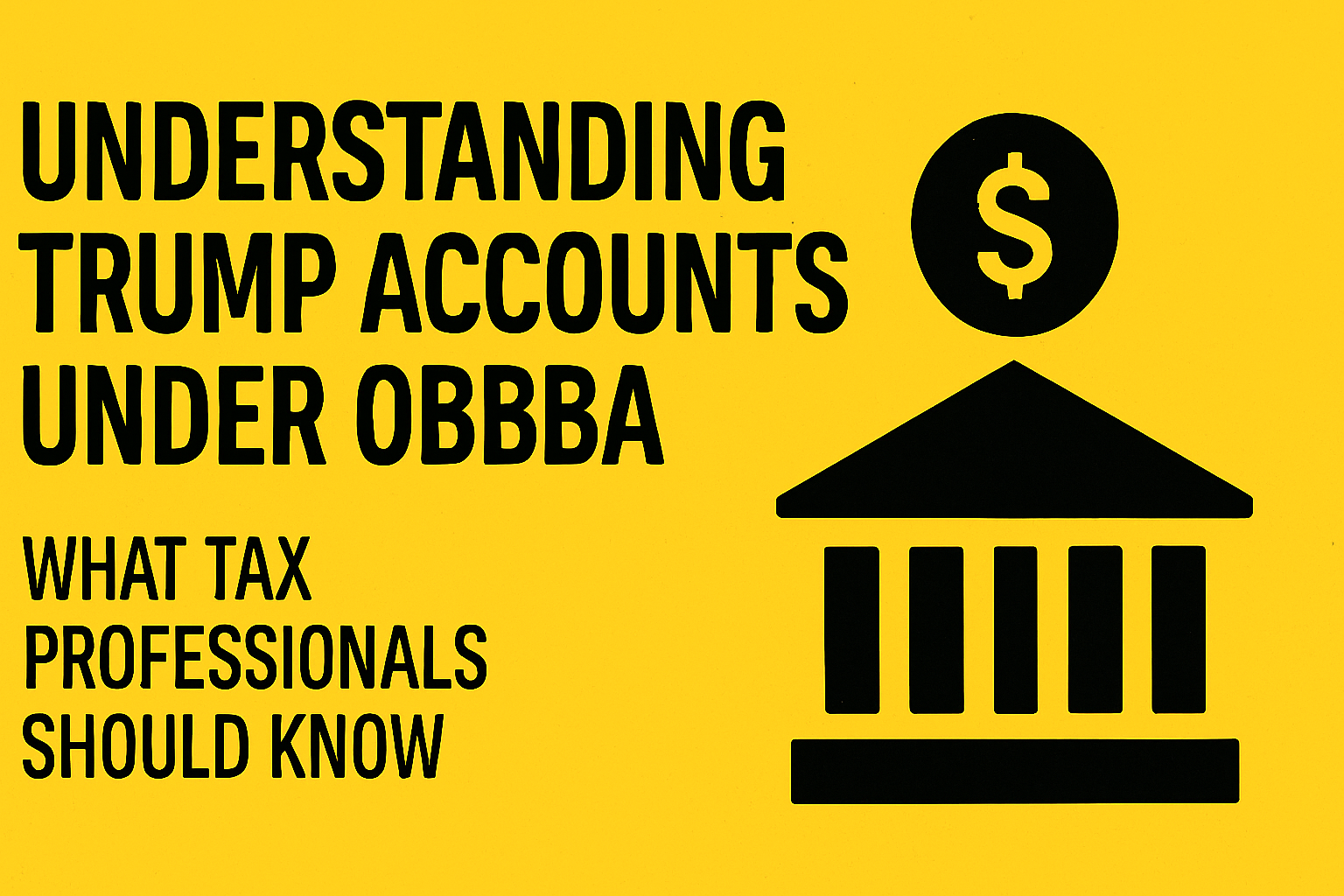Explore how the One Big Beautiful Bill Act (OBBBA) introduces Trump Accounts, its tax‑advantaged structure, contribution limits, and interplay with OBBBA’s individual tax rate changes. Ideal for tax and financial professionals seeking clarity on AI tax research, AI tax tool capabilities, and how agentic AI in tax can help model client scenarios. Learn why these accounts matter—and how to act—before the next filing season. Click to dive deeper.
Introducing Trump Accounts
What They Are
- Starting January 1, 2026, OBBBA launches Trump Accounts, a new federal pilot savings program for children born between January 1, 2025 and December 31, 2028.
- These operate similarly to individual retirement accounts—even though contributions are not deductible until the beneficiary turns 18.
Government & Private Contributions
- A $1,000 one‑time federal contribution is automatically deposited for each U.S.‑born eligible child.
- Parents, relatives, and employers may contribute up to $5,000 per year, indexed for inflation after 2027.
- Employers may contribute tax‑free up to $2,500 per employee per year, subject to non‑discrimination rules and plan documentation.
Investment and Distribution Rules
- Until the beneficiary turns 18, funds must be held in low‑fee indexed mutual funds or ETFs with a maximum annual fee of ~0.1%.
- Withdrawals are prohibited until age 18; thereafter, the account converts to a traditional IRA and distributions are taxed at ordinary income rates. Basis is not recognized on government or employer contributions, so gains are included in income, with early distribution penalties potentially applying.
Why Trump Accounts Matter for Tax Professionals
- Tax deferral benefit: While contributions accumulate tax‑free, ordinary income treatment at withdrawal may limit long‑term advantage.
- Gift implications: Depositing before age 18 likely qualifies for the gift‑to‑minor exception since the child is under 21.
- Planning strategies: Use AI tax research tools and agentic AI in tax planning to assess whether Trump Accounts outperform alternatives like 529 plans or UTMA in various scenarios (education, home purchase, small business capital).
- Important to model outcomes—for many, Roth‑like growth or flexible access of 529s might deliver better results.
How OBBBA’s Broader Tax Changes Impact Usage
Use contributions and benefits of Trump Accounts alongside:
- Permanently extended 2025 TCJA tax brackets and higher standard deductions (up to $15,750 single, $31,500 joint in 2025).
- Temporary $6,000 bonus deduction for taxpayers aged 65+ (phasing out at $75K single / $150K joint)—available through 2028.
- Expanded deductions for overtime and tips (up to $12,500/$25,000) and auto loan interest (up to $10,000 for U.S.-assembled vehicles) available 2025–2028.
Combining these features with Trump Accounts can optimize family tax planning and intergenerational strategy.
Leveraging AI Tax Tools and Agentic AI in Tax Planning
- Use AI-powered tax planning tools to simulate Trump Account contributions, projected growth, and tax impact at age 18.
- Agentic AI in tax can autonomously gather IRS rules, inflation indexing schedules, and forecast outcomes across alternative vehicles.
Clear Summary & Next Steps
Trump Accounts, a hallmark feature of the OBBBA tax package, offer a novel, federally backed child savings vehicle with potential benefits—but also important limitations. OBBBA’s permanent TCJA rate extensions, expanded deductions, and child‑focused relief features further impact strategy.
For tax professionals:
- Evaluate client eligibility for Trump Accounts.
- Compare them with 529 plans or UTMA using AI tax planning tools.
- Integrate OBBBA deduction changes into your tax modeling.
- Use agentic AI to stay current as IRS issues new guidance.
👉 Interested in streamlined AI workflows for modeling Trump Accounts scenarios? Try our AI tax tool today or book a free demo and see how AI can revolutionize your workflow.
With thoughtful planning using AI tax tools and agentic AI in tax, tax professionals can maximize client outcomes under OBBBA’s new provisions.

